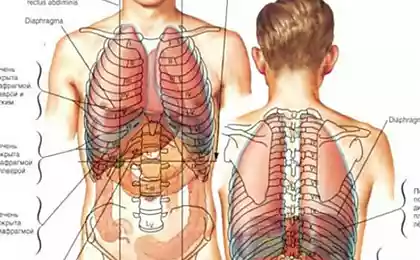214
16 Elements of Mental and Emotional Health
1. The ability to love.The ability to engage in relationships, to open up to another person. To love him as he is, with all his faults and virtues. Without idealization or depreciation. It is the ability to give, not to take. This applies to parental love for children, and partner love between a man and a woman.
2. Ability to work.This is not just about the profession. This is primarily about the ability to create and create what is valuable for a person, family, society. It is important for people to realize that what they do has meaning and meaning for others. This is the ability to bring something new, creative potential to the world. Teenagers often have difficulty with this.

3. The ability to play.Here we are talking about both the direct meaning of “games” in children and the ability of adults to “play” with words and symbols. This is an opportunity to use metaphors, allegory, humor, symbolize your experience and enjoy it. Nancy McWilliams cites a study by Estonian-American psychologist Jaak Panksepp, who proved that play is important for brain development. Young animals often play using physical contact, and this is important and significant for their development. If animals are not allowed to play one day, they will play with double zeal the next day. The scientist drew an analogy with people and concluded that it is possible that hyperactivity in children is a consequence of lack of play. There is also a general tendency in modern society to stop playing. Our games are turning from "active" to "detached-observational". We dance, sing, play sports less and more, watching others do it. I wonder what the implications are for mental health?
4. A safe relationship.Unfortunately, often people who turn to psychotherapy are in violent, threatening, dependent – in short, unhealthy relationships. And one of the goals of psychotherapy is to help them fix this. To better understand the causes and nature of this phenomenon, we can turn to John Bowlby’s attachment theory.
He described it. There are three types of attachment:
Then there was another type of attachment. Disorganized (D-type): People with this type of attachment often react to the caregiver as a source of both warmth and fear. This is characteristic of people with a borderline level of personal organization, and is often observed after abuse or rejection in childhood. Such people “stick” to the object of attachment and at the same time “bit” it.
Unfortunately, attachment disorders are a very common phenomenon. But the good news is that attachment can be changed. As a rule, psychotherapy is well suited for this (from 2 years or more). But it is possible to change the type of attachment in the presence of a stable, safe, long-term (more than 5 years) relationship with a partner.
5. Autonomy.People who turn to psychotherapy often have a lack of it (but a huge potential, since they did come to therapy). People are not doing what they really want. They don’t even have time to choose what they want. Illusory autonomy can shift to other areas of life. For example, patients suffering from anorexia often try to control something they think is available, choosing their own weight instead of their desires.
6. The constancy of self and object or the concept of integration.It is the ability to stay in touch with all sides of one’s self, both good and bad, both pleasant and not exhilarating. It is also the ability to feel conflict without being split. It's a contact between the child I was, who I am now, and the person I'll be 10 years from now. It is the ability to take into account and integrate all that nature has given me and what I have developed in myself. One of the violations of this point may be an “attack” on one’s own body when it is not unconsciously perceived as part of oneself. It becomes something separate that can be made to starve or cut, etc.

7. Capacity is restored after stress (ego power).If a person has enough ego power, then when he is faced with stress, he does not get sick, does not use only one rigid defense to get out of it, does not break down. It is the best way to adapt to a new situation.
8. Realistic and reliable self-esteem.Many people are unrealistic and too rigid in their self-esteem, possessing a critically harsh Super-Ego. The opposite situation is possible (characteristic for the United States) – on the contrary, excessive self-esteem. Parents praise their children to have the best, including the best. But such unfounded praise, devoid of love and warmth in its essence, instills in children a sense of emptiness. They don’t know who they really are, and they feel like no one really knows them. They often act as if they are entitled to special treatment, even though they have not earned it.
9. A system of value orientations.It is important that a person understands ethical norms, their meaning, while being flexible in following them. In the 19th century, there was talk of “moral insanity,” which is now referred to as antisocial personality disorder. This is a serious problem associated with misunderstanding, lack of feeling by a person of various ethical, moral and value norms and principles. At the same time, other items from this list may be saved.
10. The ability to withstand the heat of emotions.To endure emotions is to be able to stay with them, to feel them, without acting under their influence. It is also the simultaneous ability to stay in touch with both emotions and thoughts, the rational part.
11. Reflection.The ability to remain ego-dyston, to look at yourself as if from the outside. People with reflection are able to see exactly what is their problem, and accordingly treat it in a way that solves it, helping themselves as effectively as possible.
12. Mentalization. With this ability, people are able to understand that Others are completely separate individuals, with their own characteristics, personality and psychological structure. They also see the difference between feeling offended by someone’s words and actually not being offended by the other person. Rather, the resentment is caused by their personal, personal experiences and personal characteristics.
13. Wide variation of protective mechanisms and flexibility in their use.
14. The balance between what I do for myself and my surroundings.This is about being yourself and taking care of your own interests, taking into account the interests of the partner with whom you have a relationship.

15. A sense of vitality.The ability to be and feel alive. Winnicott wrote that a person can function normally, but be as if inanimate. Andre Greene also wrote about inner death.
Also interesting: Making life easier and more enjoyable: programming the subconscious
How do you know if you are acting out of your heart or fear?
16. Accepting what we cannot change.It’s about the ability to be genuinely and honestly sad, grieving for something that can’t be changed. Accepting our limitations and lamenting what we would like to have but don’t.
P.S. And remember, just by changing your consciousness – together we change the world!
Source: psy-aletheia.ru/blog/nmcw-1
2. Ability to work.This is not just about the profession. This is primarily about the ability to create and create what is valuable for a person, family, society. It is important for people to realize that what they do has meaning and meaning for others. This is the ability to bring something new, creative potential to the world. Teenagers often have difficulty with this.

3. The ability to play.Here we are talking about both the direct meaning of “games” in children and the ability of adults to “play” with words and symbols. This is an opportunity to use metaphors, allegory, humor, symbolize your experience and enjoy it. Nancy McWilliams cites a study by Estonian-American psychologist Jaak Panksepp, who proved that play is important for brain development. Young animals often play using physical contact, and this is important and significant for their development. If animals are not allowed to play one day, they will play with double zeal the next day. The scientist drew an analogy with people and concluded that it is possible that hyperactivity in children is a consequence of lack of play. There is also a general tendency in modern society to stop playing. Our games are turning from "active" to "detached-observational". We dance, sing, play sports less and more, watching others do it. I wonder what the implications are for mental health?
4. A safe relationship.Unfortunately, often people who turn to psychotherapy are in violent, threatening, dependent – in short, unhealthy relationships. And one of the goals of psychotherapy is to help them fix this. To better understand the causes and nature of this phenomenon, we can turn to John Bowlby’s attachment theory.
He described it. There are three types of attachment:
- normal
- anxious (it is difficult to bear loneliness, so a person “sticks” to a significant object),
- A person can easily let go of the Other, but remains with tremendous anxiety inside.
Then there was another type of attachment. Disorganized (D-type): People with this type of attachment often react to the caregiver as a source of both warmth and fear. This is characteristic of people with a borderline level of personal organization, and is often observed after abuse or rejection in childhood. Such people “stick” to the object of attachment and at the same time “bit” it.
Unfortunately, attachment disorders are a very common phenomenon. But the good news is that attachment can be changed. As a rule, psychotherapy is well suited for this (from 2 years or more). But it is possible to change the type of attachment in the presence of a stable, safe, long-term (more than 5 years) relationship with a partner.
5. Autonomy.People who turn to psychotherapy often have a lack of it (but a huge potential, since they did come to therapy). People are not doing what they really want. They don’t even have time to choose what they want. Illusory autonomy can shift to other areas of life. For example, patients suffering from anorexia often try to control something they think is available, choosing their own weight instead of their desires.
6. The constancy of self and object or the concept of integration.It is the ability to stay in touch with all sides of one’s self, both good and bad, both pleasant and not exhilarating. It is also the ability to feel conflict without being split. It's a contact between the child I was, who I am now, and the person I'll be 10 years from now. It is the ability to take into account and integrate all that nature has given me and what I have developed in myself. One of the violations of this point may be an “attack” on one’s own body when it is not unconsciously perceived as part of oneself. It becomes something separate that can be made to starve or cut, etc.

7. Capacity is restored after stress (ego power).If a person has enough ego power, then when he is faced with stress, he does not get sick, does not use only one rigid defense to get out of it, does not break down. It is the best way to adapt to a new situation.
8. Realistic and reliable self-esteem.Many people are unrealistic and too rigid in their self-esteem, possessing a critically harsh Super-Ego. The opposite situation is possible (characteristic for the United States) – on the contrary, excessive self-esteem. Parents praise their children to have the best, including the best. But such unfounded praise, devoid of love and warmth in its essence, instills in children a sense of emptiness. They don’t know who they really are, and they feel like no one really knows them. They often act as if they are entitled to special treatment, even though they have not earned it.
9. A system of value orientations.It is important that a person understands ethical norms, their meaning, while being flexible in following them. In the 19th century, there was talk of “moral insanity,” which is now referred to as antisocial personality disorder. This is a serious problem associated with misunderstanding, lack of feeling by a person of various ethical, moral and value norms and principles. At the same time, other items from this list may be saved.
10. The ability to withstand the heat of emotions.To endure emotions is to be able to stay with them, to feel them, without acting under their influence. It is also the simultaneous ability to stay in touch with both emotions and thoughts, the rational part.
11. Reflection.The ability to remain ego-dyston, to look at yourself as if from the outside. People with reflection are able to see exactly what is their problem, and accordingly treat it in a way that solves it, helping themselves as effectively as possible.
12. Mentalization. With this ability, people are able to understand that Others are completely separate individuals, with their own characteristics, personality and psychological structure. They also see the difference between feeling offended by someone’s words and actually not being offended by the other person. Rather, the resentment is caused by their personal, personal experiences and personal characteristics.
13. Wide variation of protective mechanisms and flexibility in their use.
14. The balance between what I do for myself and my surroundings.This is about being yourself and taking care of your own interests, taking into account the interests of the partner with whom you have a relationship.

15. A sense of vitality.The ability to be and feel alive. Winnicott wrote that a person can function normally, but be as if inanimate. Andre Greene also wrote about inner death.
Also interesting: Making life easier and more enjoyable: programming the subconscious
How do you know if you are acting out of your heart or fear?
16. Accepting what we cannot change.It’s about the ability to be genuinely and honestly sad, grieving for something that can’t be changed. Accepting our limitations and lamenting what we would like to have but don’t.
P.S. And remember, just by changing your consciousness – together we change the world!
Source: psy-aletheia.ru/blog/nmcw-1
Battery SolidEnergy 2 times less analogues with the same capacity
This stimulating and rejuvenating treatment is indispensable for those who are over 40























